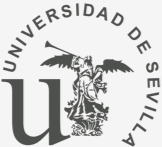Immune signaling in neurodegenerative proteinopathies
Short Academic Biography of Cintia Roodveldt
Cintia Roodveldt is Assoc. Professor at the University of Seville (Dept. of Medical Biochemistry, Molecular Biology and Immunology), where she has been a faculty member since 2010. She is Principal Investigator at CABIMER-Center of Molecular Biology and Regenerative Medicine, Seville.
After graduating at the School of Biochemistry (1999, UNL, Argentina), she carried out her PhD studies (2000-2005) at The Weizmann Institute of Science (Israel, Supervisor: Dr. Dan S. Tawfik) and then performed a Postdoctoral stage (2006-2009) at Prof. Chris M. Dobson’s lab (University of Cambridge, UK). She received a number of fellowships and awards, including the Rodolfo May Fellowship (Weizmann Institute of Science/FGS), FEBS Long-Term Fellowship, FEBS Distinguished Young Investigator Award (2010), Clare Hall Research Fellow distinction (Cambridge) and Ramón y Cajal Programme (Spain).
Her research interests are related to molecular mechanisms and immune signaling in neurodegenerative proteinopathies, including the identification of novel therapeutic targets that could lead to effective disease treatment.
Projects
Neurodegenerative diseases, including Amyotrophic Lateral Sclerosis (ALS), Parkinson’s and Alzheimer’s, are incurable and increasingly prevalent disorders characterized by progressive neuronal loss, the aggregation of specific proteins in the CNS, and the buildup of neuroinflammation. Indeed, it is currently thought that dysregulated immune responses involving uncontrolled microglia activation and peripheral immune imbalance play a major role in pathogenesis (Roodveldt et al., 2024). However, the mechanisms driving neurotoxic or neuroprotective immune processes in these highly complex disorders remain incompletely understood.
The aim of our research is to identify molecular mechanisms, signaling mediators and novel therapeutic targets related to relevant immune pathways involved in neurodegenerative diseases, particularly ALS and Parkinson.
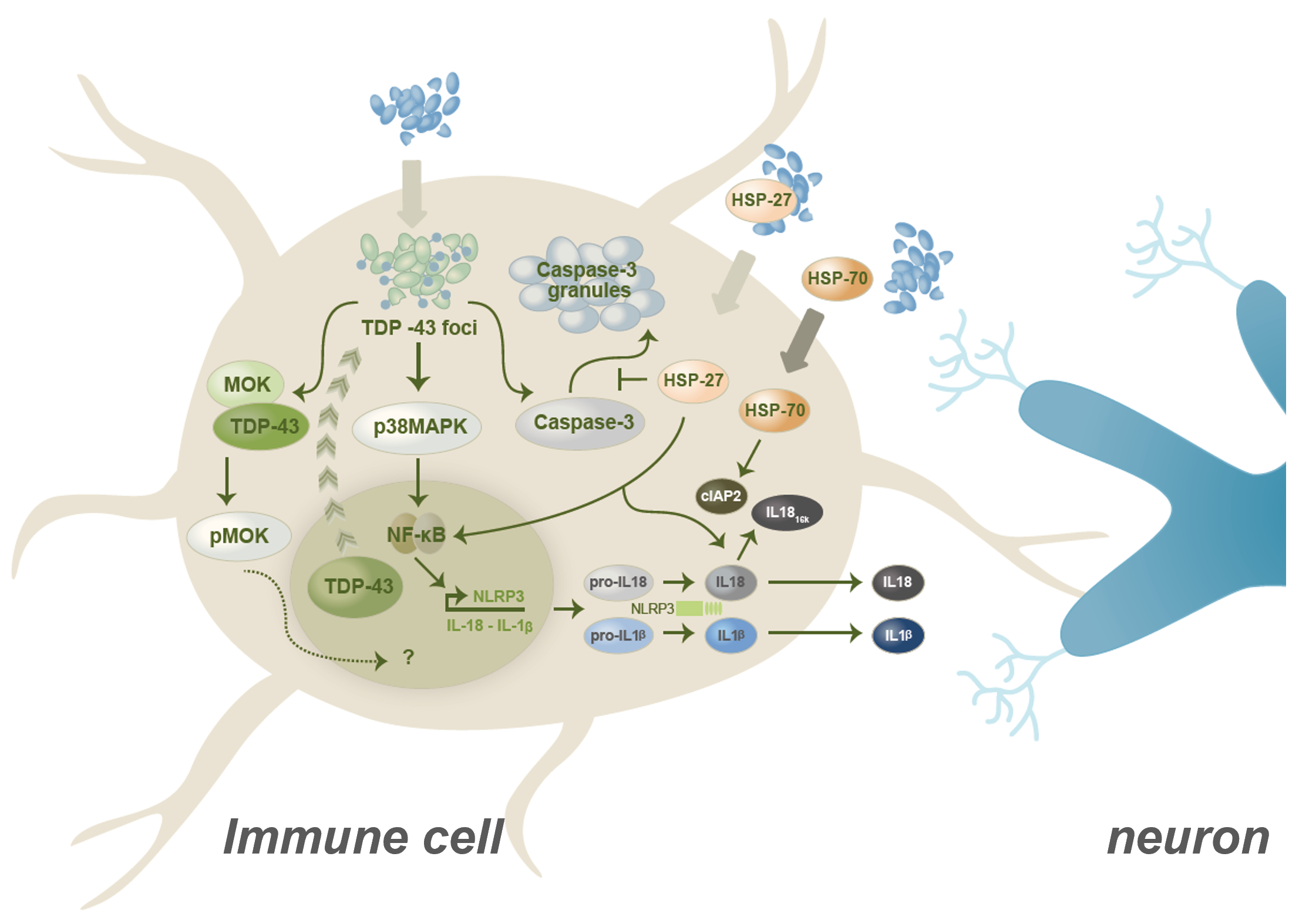
Research Lines
a. Molecular mechanisms of immune responses in neurodegenerative diseases (ALS, Parkinson’s).
b. Role, mechanism and therapeutic potential of immune signaling kinases in ALS.
c. Transcriptional dynamics of immune cells in neurodegenerative and neuroinflammatory diseases.
Research Highlights
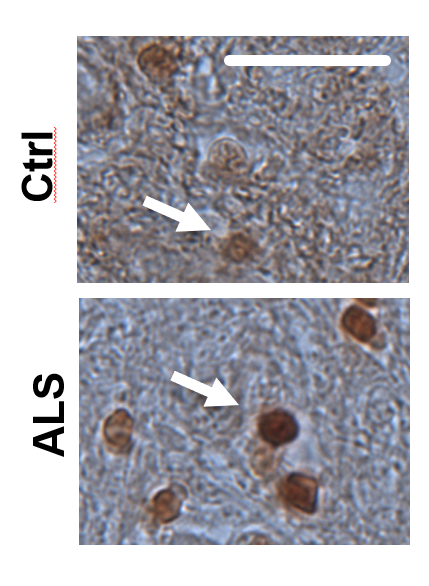 Amyotrophic lateral sclerosis (ALS) remains a devastating and incurable disease. Several studies have shown that microglia, the main immunocompetent cells in the CNS, become activated and neurotoxic, thereby contributing to motor neuron loss and disease onset and progression.
Amyotrophic lateral sclerosis (ALS) remains a devastating and incurable disease. Several studies have shown that microglia, the main immunocompetent cells in the CNS, become activated and neurotoxic, thereby contributing to motor neuron loss and disease onset and progression.
Our research work recently revealed the signaling kinase MOK (MAPK/MAK/MRK overlapping kinase), as a protein that mediates microglial inflammatory and type-IFN responses through a mechanism that directly implicates the epigenetic reader BRD4 (Pérez-Cabello, PNAS 2023).
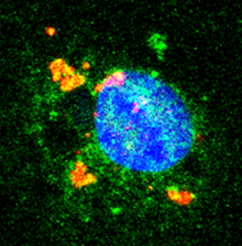 Given that signaling kinases are known to be central immune mediators whose functions may be dysregulated in neuroinflammation-associated neurodegenerative diseases (Roodveldt et al., 2024; García-García et al., 2021) we sought to dissect the signaling pathways regulated by MOK in ALS-linked microglial responses. Apart from identifying BRD4 as a downstream target, we showed that MOK regulates both BRD4’s phosphorylated levels and chromatin-binding functions in the cell nucleus. Moreover, by applying proteomics and transcriptomics analyses, we revealed a number of key immune pathways that are activated upon immune stimulation in a MOK-dependent manner.
Given that signaling kinases are known to be central immune mediators whose functions may be dysregulated in neuroinflammation-associated neurodegenerative diseases (Roodveldt et al., 2024; García-García et al., 2021) we sought to dissect the signaling pathways regulated by MOK in ALS-linked microglial responses. Apart from identifying BRD4 as a downstream target, we showed that MOK regulates both BRD4’s phosphorylated levels and chromatin-binding functions in the cell nucleus. Moreover, by applying proteomics and transcriptomics analyses, we revealed a number of key immune pathways that are activated upon immune stimulation in a MOK-dependent manner.
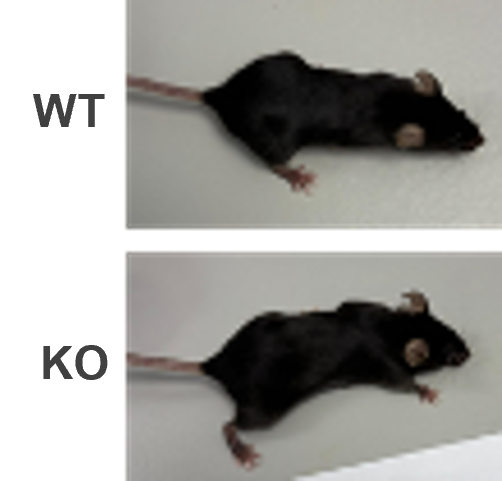 Remarkably, we also found that MOK is altered in spinal cord tissue from ALS patients and mouse models, particularly in microglial cells (Pérez-Cabello et al., 2023). Overall, our findings support a role for MOK in the pathogenic mechanisms of ALS and contributes to the search for novel and effective therapeutic targets against ALS and other neurodegenerative diseases.
Remarkably, we also found that MOK is altered in spinal cord tissue from ALS patients and mouse models, particularly in microglial cells (Pérez-Cabello et al., 2023). Overall, our findings support a role for MOK in the pathogenic mechanisms of ALS and contributes to the search for novel and effective therapeutic targets against ALS and other neurodegenerative diseases.
For PhD STUDENT and POSTDOC applications, please send motivation letter and CV to cintia.roodveldt@cabimer.es
Funding (current and recent)
ORCID ID: https://orcid.org/0000-0003-4124-8769
Researcher ID: I-9118-2014
Selected Publications:
- Immunity in Parkinson’s disease: what we know so far. Roodveldt C, Bernardino L, Oztop-Cakmak O, Dragic M, Espolin Fladmark K, Ertan S, Pita C, Ciglar L, Busra A, Garraux G, Williams-Gray C, Pacheco R, Romero-Ramos M. Brain. 147(10):3306-3324.
- MAPK/MAK/MRK overlapping kinase (MOK) controls microglial inflammatory/type-I IFN responses via Brd4 and is involved in ALS. Pérez-Cabello JA, Silvera-Carrasco L et al., Tartaglia GG, Sawarkar R, García-Dominguez M, Pozo D, Roodveldt C. Proc Natl Aacd Sci. USA. 120(28):e2302143120. 2023.
- Immune signalling kinases in Amyotrophic Lateral Sclerosis and Frontotemporal Dementia. García-García R, Martín-Herrero L, Blanca-Pariente L, Pérez-Cabello JA, Roodveldt C. Int. J. Mol. Sci. 22(24):13280. 2021.
- Distinct responses of human peripheral blood cells to different misfolded protein oligomers. Leal-Lasarte M, Mannini B, Chiti F, Vendruscolo M, Dobson CM, Roodveldt C, Pozo D. Immunology. 164(2):358-371. 2021.
- Differential Interactome and Innate Immune Response Activation of Two Structurally Distinct Misfolded Protein Oligomers. Mannini B, Vecchi G, Labrador-Garrido A, Fabre B, Fani G, Franco JM, Lilley K, Pozo D, Vendruscolo M, Chiti F, Dobson CM, Roodveldt C. ACS Chem Neurosci. 10(8):3464-3478. 2019.
- Immunization with α-synuclein/Grp94 reshapes peripheral immunity and suppresses microgliosis in a chronic Parkinsonism model. Villadiego J, Labrador-Garrido A, Muñoz-Franco J, Leal-Lasarte MM, De Genst EJ, Dobson CM, Pozo D, Toledo-Aral JJ, Roodveldt C. Glia 66(1):191-205. 2018.
- Extracellular TDP-43 aggregates target MAPK/MAK/MRK (MOK) kinase and trigger caspase-3/IL-18 signaling in microglia. Leal-Lasarte MM, Franco JM, Labrador-Garrido A, Pozo D, Roodveldt C. FASEB J. 31(7):2797-2816. 2017.
- The chaperonin CCT inhibits assembly of α-synuclein amyloid fibrils by a specific, conformation-dependent interaction. Sot B, Rubio-Muñoz A, Leal-Quintero A, Martinez-Sabando J, Marcilla M, Roodveldt C, Valpuesta JM. 2017. Sci. Rep. 7:40859. 2017.
- Chaperome screening leads to identification of Grp94/Gp96 and FKBP4/52 as modulators of the α-synuclein-elicited immune response. Labrador-Garrido A, Cejudo-Guillén M, Daturpalli S, Leal MM, Klippstein R, De Genst EJ, Dobson CM, Jackson SE, Pozo D, Roodveldt C. FASEB J. 30(2):564-77. 2016.
- The ‘Omics’ of Amyotrophic Lateral Sclerosis. Caballero-Hernandez D, Toscano MG, Cejudo-Guillen M, Garcia-Martin ML, Lopez S, Franco JM, Quintana FJ, Roodveldt C, Pozo D. Trends Mol Med. 22(1):53-67. 2016.
- Structural characterization of toxic oligomers that are kinetically trapped during α-synuclein fibril formation. Chen SW, Drakulic S, Deas E, Ouberai M, Aprile FA, Arranz R, Ness S, Roodveldt C, et al., Dobson CM, Cremades N. Proc Natl Aacd Sci. USA 112(16):E1994-2003. 2015.
- Preconditioning of microglia by α-synuclein strongly affects the response induced by TLR stimulation. Roodveldt C, Labrador A, Gonzalez-Rey E, Lachaud CC, Guilliams T et al., Dobson CM, Pozo D. PLoS One 8:e79160. 2013.
- Molecular mechanisms used by chaperones to reduce the toxicity of aberrant protein oligomers. Mannini B, Cascella R, Zampagni M, van Waarde-Verhagen M, Meehan S, Roodveldt C, et al., Chiti F. Proc Natl Aacd Sci. USA 109:12479-84. 2012.
- Chaperone proteostasis in Parkinson’s disease: molecular insights into the Hsp70/α-synuclein complex. Roodveldt C, Bertoncini CW, Andersson A, van der Goot AT, Hsu ST, Fernandez-Montesinos R, de Jong J, van Ham TJ, Nollen EA, Pozo D, Christodoulou C, Dobson CM**. EMBO J. 28, 3758-70. 12/1. 2009.
- Shared promiscuous activities and evolutionary features in various members of the amidohydrolase superfamily. Roodveldt C & Tawfik DS. Biochemistry. 44, 12728-12736. 2005.
- The ‘evolvability’ of promiscuous protein functions.Aharoni A, Gaidukov L#, Khersonsky O, McQ Gould S#, Roodveldt C# & Tawfik DS. #Equally contributing authors. Nat. Genet. 37, 73-76. 2005.







